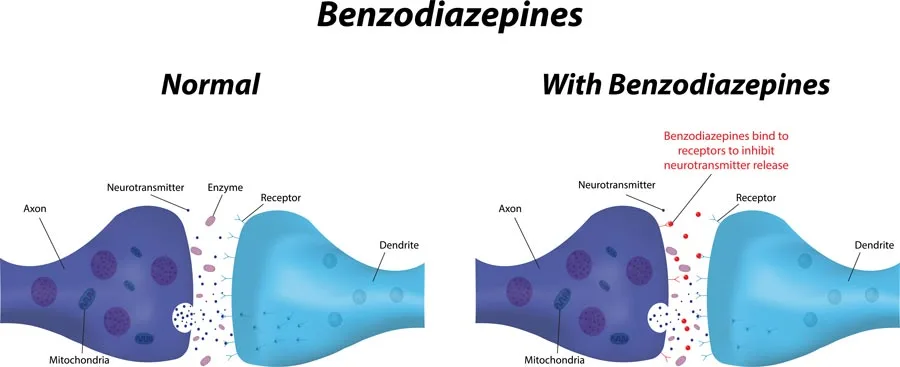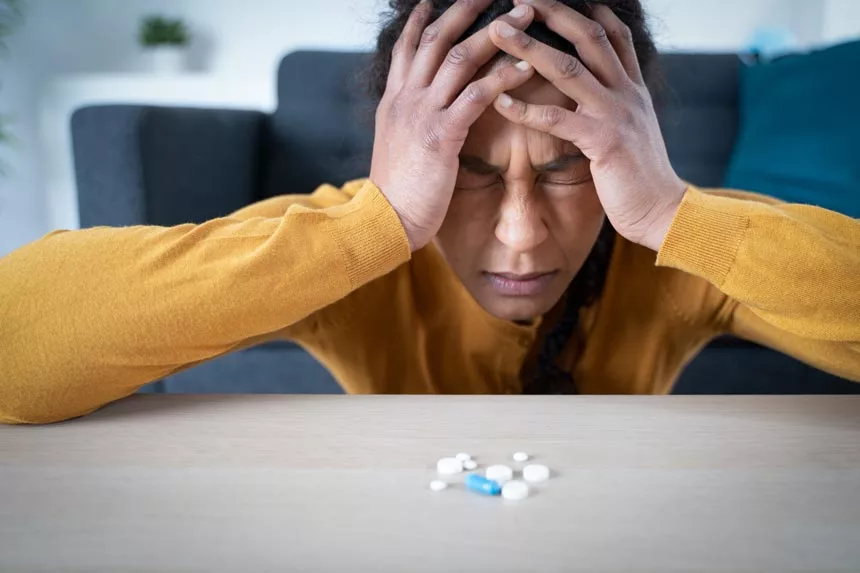What are Benzodiazepines?
Table of Contents
- What are Benzodiazepines?
- How are Benzodiazepines Used?
- How Do Benzodiazepines Affect the Body?
- Are Benzodiazepines Addictive?
- How Long Does it Take to Form a Benzodiazepine Addiction?
- What are the Most Addictive Benzodiazepines?
- Who is at Risk for Benzodiazepine Abuse?
- What Does Benzodiazepine Abuse Look Like?
- The Side Effects of Benzodiazepine Abuse
- What are the Signs of a Benzodiazepine Overdose?
- Benzodiazepine Withdrawal Symptoms
- What to Expect During Benzodiazepine Addiction Treatment
- Why is Medical Detox Necessary for Treating Drug Abuse?
- Finding The Right Addiction Treatment Options For You
- Medically Reviewed By
Benzodiazepines, also known as benzos, are sedative prescription drugs that are often used to treat people who are struggling with anxiety and insomnia. These can also be effective in reducing or eliminating seizures and muscle spasms. Benzos can be very habit-forming, and benzodiazepine addiction is fairly common.
Benzodiazepines are sold under many different name-brand medications, each of which can be used to treat these problems. The most commonly prescribed medications under this class include:
According to the Drug Enforcement Administration (DEA), benzodiazepines are currently considered a Schedule IV controlled substance. This means that, while these drugs have an accepted medical usage, they also pose a particularly high substance abuse risk.
Keep reading to find out the methods of treatment available and effective ways of overcoming addiction to benzodiazepines!
How are Benzodiazepines Used?
Benzodiazepine use can take place through several methods of administration. The most common of these include taking this drug orally in tablet or pill form, as is done with most medically prescribed benzos.
However, for individuals who are abusing benzodiazepines, these tablets may be crushed and turned into a powder. This can then be snorted, smoked, or dissolved in water and injected in order to produce a faster and possibly stronger high.
Benzodiazepine use has also become increasingly prevalent amongst heroin and cocaine abusers, adding a new face to the opioid epidemic currently wreaking havoc across the U.S..
According to the Center for Disease Control and Prevention (CDC), Benzodiazepines were linked to 6,982 overdose deaths that occurred during January 2019–June 2020, with opioids involved in 6,384 of these deaths.
How Do Benzodiazepines Affect the Body?
Benzodiazepines have a direct effect on the central nervous system (CNS) through stimulating gamma-aminobutyric acid (GABA) – a neurotransmitter that reduces neuron stimulation – levels in the brain.
This interaction slows down cognitive function, producing a calming sensation throughout the body. The effects of benzodiazepines on the CNS are what makes them particularly efficient in treating anxiety disorders.
However, this sedative nature is also what makes it so easy to form a physical dependence on them. Because of this, the use of benzodiazepines for medical purposes is extremely regulated.
In many cases, people who are prescribed benzodiazepines will only use these drugs in relatively low doses, and for short periods of time.
Are Benzodiazepines Addictive?
Because of their ability to alter the chemical structure of a person’s brain, benzodiazepine misuse can lead to the development of both a physical and psychological dependence on this drug.
As an individual builds a tolerance to this drug, they will need to take continuously larger doses in order to achieve the same effect as when they first started using it. This progressively increased usage is what will eventually result in full-blown drug addiction.
How Long Does it Take to Form a Benzodiazepine Addiction?
How long it will take an individual to develop a benzodiazepine dependence will vary based on several factors, including how much, how often, and what benzo they are taking, as well as the existence of any co-occurring mental disorders or previous history of addiction.
For example, someone with an anxiety disorder may begin abusing benzodiazepines more quickly than another person, as this drug may be the only thing that helps them feel normal or capable of handling day-to-day life.
Meanwhile, someone who has previously abused substances will be more susceptible to falling back into these habits than a person who’s habits of benzodiazepine use is their first experience with addiction.
Generally, however, this form of drug dependence can develop quite quickly. If someone is regularly taking high doses of benzos, or is using them more frequently than necessary, these habits can result in addiction within only a few weeks.
The Different Types of Benzodiazepines
Benzodiazepines consist of several different types of prescription medications, each of which can have different effects on a person’s brain. This includes shorter-acting, intermediate-acting, and longer-acting benzodiazepines.
Shorter-acting benzodiazepines have brief half-lives, meaning their effects set in faster, and they leave the system more quickly than other benzodiazepines. These are typically used to help individuals struggling with insomnia to better manage this sleep disorder, and include:
- Estazolam
- Flurazepam
- Temazepam
- Triazolam
Intermediate-acting benzodiazepines, such as alprazolam (Xanax), lorazepam (Ativan), and temazepam (Restoril), have a more moderate onset and duration of their effects, and stay in a person’s system for longer than shorter-acting benzos, but briefer than longer-acting ones.
Longer-lasting benzodiazepines act by producing effects that last for long periods of time (typically a few hours) and have extensive half-lives. These can remain in a person’s body for several weeks and are an effective short-term solution for anxiety symptoms.
These benzos include chlordiazepoxide (Librium), clorazepate (Tranxene), diazepam (Valium), and halazepam (Paxipam).
What are the Most Addictive Benzodiazepines?
Unfortunately, benzodiazepine misuse has become increasingly common within the U.S., particularly in cases where these medications have been mixed with other dangerous drugs.
According to the National Institute on Drug Abuse (NIDA), from 2015 to 2016, around 5.3 million people reported misusing benzodiazepines.
This trend was particularly common amongst teens and young adults that did not have benzodiazepine prescriptions but acquired the drug from friends or relatives who did. In these cases, they were used as sleeping pills, or as enhancers to other substances.
The most commonly abused benzodiazepines include:
- Clonazepam (Klonopin). Klonopin is one of the most addictive benzos a person can use, as well as one of the most commonly prescribed. This drug can produce extreme euphoric feelings, which can make users eager to continue taking it.
- Alprazolam (Xanax). Effective treatment for someone struggling with an anxiety or panic disorder, Xanax is quite the popular party drug, often taken with alcohol to increase its sedative effects. Its short half-life means its effects wear off relatively quickly, making it more common to take this drug frequently and in high doses.
- Diazepam (Valium). Taking Valium can make individuals feel more sleepy than other benzos, making it an effective solution for insomnia. However, even using this drug for only a few weeks can result in addiction. Many individuals who have been prescribed this drug will have to be tapered off of it in order to avoid withdrawal.
- Lorazepam (Ativan). Commonly used in hospitals to help ease panic symptoms, this benzo is not necessarily prominent within the addiction community. However, when this drug is prescribed, it can be extremely addictive, and potentially harder to quit than other benzos.
- Triazolam (Halcion). While not as recognizable as other drugs in its class, Halcion still poses an extremely high risk for addiction. Most individuals who are prescribed this medication will only use it for up to 7-10 days at a time, as anything more than this will very likely result in the development of a dependence on it.
Who is at Risk for Benzodiazepine Abuse?
While anyone can form a substance addiction, there are certain individuals who may be more at risk of developing drug abuse problems. Factors that may increase a person’s likelihood of engaging in substance abuse include:
- Personal or family history of addiction
- Difficult environmental conditions, such as a high-stress job, or demanding school or home responsibilities
- Social influences, such as friends, co-workers, or family members who regularly abuse drugs or alcohol
When it comes to benzodiazepine abuse, individuals with prescriptions for these drugs will be at risk of developing an addiction if they are misusing them. This is why it is always recommended to use benzos as instructed, even if a person thinks their prescribed dosage is not helping.
Perhaps the most significant risk of benzo abuse, however, is psychiatric comorbidity, or the presence of a mental health condition alongside a substance use disorder.
The Relationship Between Substance Abuse and Mental Health
According to the Substance Abuse and Mental Health Services Administration (SAMSHA), individuals with mental health disorders often turn to drugs and alcohol as a means of self-medicating the negative thoughts and emotions these conditions cause.
This, however, is rarely ever an effective solution. Even in the event that a person’s substance abuse does provide relief from these painful feelings, this is only a temporary solution; and, unfortunately, one that often only makes these issues worse over time.
What Does Benzodiazepine Abuse Look Like?
For people who have been prescribed benzos, an addiction to this medication can be so gradual that you do not realize you have a problem. Even so, a benzodiazepine dependence will lead to at least a few different physical, psychological, and behavioral side effects.
According to the Diagnostic and Statistical Manual of Mental Disorders (DSM-5), there are several ways in which someone can identify if their loved one may be struggling with benzodiazepine abuse. These may include:
- Taking the drug in larger amounts or for longer periods of time than originally intended
- Acquiring prescriptions from multiple doctors and pharmacies in order to build a larger supply, or “doctor shopping”
- Regularly being unsuccessful in attempts to cut down or stop using the drug by oneself
- Spending large amounts of time engaging in drug-seeking behavior, using the drug, recovering from its effects
- Experiencing strong drug cravings when not using
- Experiencing difficulties at work, school, or home due to drug use
- Continuing to use the drug despite this causing issues with personal, familial, and/or work relationships
- Giving up previously enjoyable hobbies and activities in order to continue using
- Repeatedly using the drug in situations that could be physically dangerous to oneself or others, such as driving, operating machinery, or otherwise
- Continuing to use the drug despite this potentially causing or worsening physical or psychological health issues
- Needing to use the drug in larger doses or more frequently in order to achieve the desired effect
- Experiencing withdrawal symptoms when not using the drug
The Side Effects of Benzodiazepine Abuse
There are several unpleasant side effects that may develop as a result of abusing benzodiazepines. These typically occur after long-term abuse of these drugs and may include those that are both psychological and physical in nature.
Long-term benzodiazepine abuse symptoms will typically produce effects that can be quite severe, including:
- Anorexia
- Insomnia
- Anxiety
- Tremors
- Headaches
- Insomnia
- Memory problems
When regularly taking benzodiazepines in larger doses, individuals are increasing their risk of experiencing acute toxicity, and potentially fatal overdose from these drugs’ effects.
This risk is even more prevalent for those engaging in polydrug abuse, or simultaneously abusing multiple substances at once.
What are the Signs of a Benzodiazepine Overdose?
There are several warning signs that may indicate that someone is experiencing toxic effects from their benzo abuse. Common symptoms associated with a benzodiazepine overdose include:
- Agitation
- Anxiety
- Blue tint to your fingernails or lips
- Blurred vision
- Mental confusion
- Difficulty breathing
- Dizziness
- Sleepiness
- Slurred speech
- Unresponsiveness or weakness
If you believe that you or a loved one may be experiencing an overdose, it is extremely important that you call for help right away. Emergency medical attention can help reverse a benzo overdose, preventing permanent health problems or even death.
Benzodiazepine Withdrawal Symptoms
If someone has a severe benzodiazepine dependence, suddenly stopping their usage of this drug can cause them to develop intense, and potentially life-threatening withdrawal symptoms.
The withdrawal period following benzodiazepine discontinuation typically takes place over the course of three separate stages, including:
- Early withdrawal
- Acute withdrawal
- Protracted Withdrawal
Early Withdrawal
The early withdrawal phase will typically last between two to three days, and may cause an individual to develop (or re-develop) anxiety and insomnia. This stage may also cause a significant decrease in a person’s appetite, as well as frequent headaches.
Acute Withdrawal
The acute withdrawal phase is the longest and often most difficult stage of benzodiazepine withdrawal. Many individuals will experience an extensive set of uncomfortable side effects during this period, including:
- Agitation
- Blurred vision
- Brain fog
- Cravings
- Diarrhea
- Irritability
- Hallucinations or sensory hypersensitivity
- Insomnia
- Mood swings
- Nausea and vomiting
- Problems concentrating
- Seizures
- Weight loss
This stage will usually last for three to seven days, before slowly beginning to taper off. For many individuals overcoming benzodiazepine abuse, this will be the final phase of their withdrawal period.
However, for those with more severe addictions to these drugs, they may find themselves progressing into a more rare third stage: protracted withdrawal.
Protracted Withdrawal
While only a small portion of those recovering from benzodiazepine addiction will experience protracted withdrawal, this stage can last over several months or even years. During this time, individuals may experience:
- Anxiety
- Depression
- Insomnia
- Mood swings
- Muscle twitches
- Tingling in the arms and legs
These symptoms often come and go without warning, but will eventually go away. When these will fade, however, can be difficult to determine, as this will depend on a number of factors.
These include how long someone has been abusing benzodiazepine, as well as the amount and method of use. Even the type of benzodiazepine, such as Xanax vs Klonopin (due to differences in half-life) can make a difference in the experience of withdrawal symptoms.
What to Expect During Benzodiazepine Addiction Treatment
When it comes to substance abuse treatment, there is no one-size-fits-all recovery approach. Thus, many individuals will benefit from progressing through various levels of care in their addiction treatment process.
Benzo addiction treatment will typically include both medical treatment and behavioral therapy treatment. Because of how difficult benzodiazepine withdrawal can be, most people begin with a medical detox program.
After a person has completely detoxed from benzos, the next step in their addiction treatment process will usually involve participating in inpatient or outpatient treatment programs. Both, of which, will likely involve some level of behavioral therapy.
There are many different therapy programs available, including cognitive-behavioral therapy, individual therapy, group therapy, family therapy, and more. These can help address any underlying mental health issues that may be contributing to a person’s addictive behaviors.
This level of care can also provide individuals with emotional support during their recovery process, as well as help them build healthier ways to deal with stress; primarily, those which do not involve substance use.
Why is Medical Detox Necessary for Treating Drug Abuse?
Because of how intense benzodiazepine withdrawal can be, medical detox programs are a critical part of this addiction treatment process, as they help individuals overcome their addictions with constant clinical supervision and support.
Participating in a detox program will allow you to be gradually weaned off of benzos in a controlled environment, reducing and even preventing some of the more severe withdrawal effects of benzodiazepines.
Furthermore, you may be administered specific addiction medicine designed to help further combat these withdrawal symptoms, as well as reduce drug cravings that can increase your risk of relapse.
Benzodiazepine addiction can be an exceedingly difficult thing to overcome due to the severity of the withdrawal process. But you do not have to let this addiction continue to control your life. With the help of a quality rehab program, you can detox more safely and comfortably.
Finding The Right Addiction Treatment Options For You
If you or a loved one is struggling with benzodiazepine addiction, this can be incredibly emotionally and physically damaging not just for the addicted individual, but for the people around them as well.
At Find Addiction Rehabs, we are committed to connecting people like you with addiction treatment centers and programs that can serve all of your care needs. Our hotline is available 24/7 to provide you with recovery tools and resources, anytime you need them.
So make the right choice, and call now to get started on your path to getting the treatment you need to achieve a happier, healthier, and sober you, today!
Nicole Rogers is an experienced and accomplished writer with special interests in the fields of Anthropology, English, and behavioral health, and has written countless articles for newspaper publications, institutional research journals, and Find Addiction Rehabs.
Her alma mater is Florida Atlantic University in Boca Raton. Nicole hopes to spread awareness of and combat the stigmatization surrounding addiction and substance abuse treatment through her writing and work in the field.






